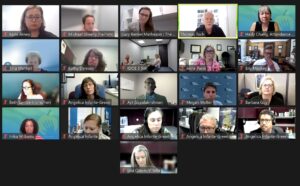

August 23, 2023
While most students across the country have returned to their regular schooling routines, a key difference remains: a growing number of unoccupied cubbies, unused backpack hooks, and empty lockers. Nearly a decade ago, approximately seven million students in the U.S. were considered chronically absent – today, that number has more than doubled, with 16 million students, or one-in-three, identified as chronically absent as of 2022.
Students who miss over 18 school days are less likely to reach critical literacy milestones and attendance rates can often be a strong predictor of a student’s likelihood to graduate – one year of absenteeism between 8th and 12th grade was associated with a seven-fold increase in the likelihood of dropout.
 On August 2nd, 2023, The Hunt Institute’s State Education Leaders Collaborative met for the second time, this time virtually, to learn more about the growing chronic absenteeism crisis and explore strategies for getting students back in the classroom. The State Education Leaders Collaborative model brings together state education executives and their teams throughout the year to develop strategic solutions for high-priority education issues. Leaders from Rhode Island, Tennessee, Iowa, Maine, Alabama, and Connecticut joined the conversation with national resource experts.
On August 2nd, 2023, The Hunt Institute’s State Education Leaders Collaborative met for the second time, this time virtually, to learn more about the growing chronic absenteeism crisis and explore strategies for getting students back in the classroom. The State Education Leaders Collaborative model brings together state education executives and their teams throughout the year to develop strategic solutions for high-priority education issues. Leaders from Rhode Island, Tennessee, Iowa, Maine, Alabama, and Connecticut joined the conversation with national resource experts.
Thomas Toch, Director of FutureEd, and Hedy Chang, Founder and Executive Director of Attendance Works, joined this month’s session to provide further context for this growing issue, discuss possible interventions, and offer resources to assist state leaders in returning students to the classroom. Both experts outlined various scalable strategies from handwashing and advisory groups to broader policy changes such as improving data sharing, implementing early warning systems, and decriminalizing truancy.
The newly published Attendance Playbook from FutureEd and Attendance Works outlines more than two dozen strategies for addressing chronic absenteeism, ranging from school culture and climate recommendations to what systemic shifts are needed to support re-engaging students and families with our education systems. The interventions described in the playbook identify root causes and tiered solutions for chronic absenteeism, offer supporting research, and provide exemplars of schools and districts already implementing the strategy.
The discussion began with the importance of improving data collection and transparency nationally. Forty-eight states now collect and publish data on chronic absenteeism, up from nine in 2019. Toch highlighted the Child Equity Index in Tulsa, Oklahoma as an example of a tool and community that has effectively leveraged data to improve student attendance – school leaders have been able to identify neighborhoods with insufficient bus routes for students and work with the city to increase transportation accessibility in the area.
Attendees also discussed school-level re-engagement strategies and shifting attitudes towards learning as students and families re-adjust to in-person learning. Toch emphasized the importance of in-person instruction, sharing a personal pandemic takeaway that “school should be a place, not a process.” Part of building a school that adjusts to post-pandemic challenges is creating a sense of connectedness and belonging for students. One approach is through implementing student-teacher advisory groups. Advisory groups offer an opportunity to build relationships with students, teachers, or other school staff to promote a sense of engagement and community investment.
Home visits were also identified as an opportunity to connect with families and collect more qualitative information on barriers to consistent attendance. Chang highlighted Connecticut’s work in data sharing through the Learner Engagement and Attendance Program (LEAP). Program participants who had access to home visits experienced an increase of 15 percentage points in attendance.
Key takeaways from our August 2nd session can be found here.
The 2023 State Education Leaders Collaborative will meet for a final time on October 25th-26th in Cary, North Carolina to explore the non-academic factors that impact student learning.